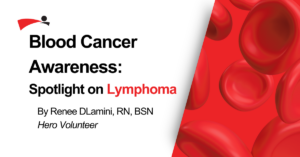Blood Cancer Awareness: Spotlight on Lymphoma
Understanding Lymphoma
Lymphoma is a type of blood cancer that starts in the cells of your body’s immune system. Your immune system is made up of a network of tubes and organs. They work together to remove unwanted substances from your body.
The lymph system is an important part of your immune system because it protects your body from disease and infection. The structures either store, transport, or produce various types of white blood cells. It includes organs like the spleen, tonsils, thymus, as well as lymph fluid that flows through tube-like structures called lymph vessels. Bone marrow plays a crucial role in this network because it is originally where blood cells are produced.
Your lymph system has filter stations called lymph nodes, which contain white blood cells responsible for clearing bacteria and toxins from lymph fluid. There are close to 800 lymph nodes clustered around the body, located in your neck, underarms, chest, abdomen, pelvis, and groin. In lymphoma, mutations occur in the white blood cells within the lymph nodes. These cells begin to grow uncontrollably and accumulate, forming tumors.
There are many types of Lymphomas. In fact, there are over 60 types. However, they can be sorted into two main categories: Hodgkin’s Lymphoma and Non-Hodgkin’s Lymphoma.
Hodgkins Lymphoma can often be cured if caught and treated early.
Non-Hodgkins Lymphoma can progress either slowly or aggressively.
Symptoms
Fatigue – may be caused by different factors such as increased energy demands, anemia, or the release of certain types of chemicals.
Swelling in the neck that lasts for more than two weeks – can be caused by an accumulation of white blood cells, resulting in enlarged lymph nodes.
Unexplained weight loss – may occur due to increased metabolic demands and a lack of appetite.
Fever- is a response to elevated white blood cells as the body attempts to fight off foreign invaders.
Soaking night sweats – can also result from the fever or body’s release of certain chemicals
Pain, swelling, or fullness in the abdomen – may indicate an enlarged spleen.
Coughing, difficulty breathing, or chest pain – can be associated with an enlarged thymus gland or Lymph nodes, pressing on the windpipe or its branches.
Tests and diagnosis
Complete Blood Count: This test measures the number of red blood cells, white blood cells, and platelets (which are important for blood clotting). An abnormal count—either too high or too low—can be a cause for concern.
LDH Test (Lactic Dehydrogenase): Elevated levels in this test may indicate tissue damage, lymphoma, or other diseases.
CT Scan: This imaging technique provides detailed images of internal body structures, including the lymph nodes, and can help detect abnormalities.
PET Scan: A specialized scan that specifically identifies malignant tumors in the body.
Bone Marrow Biopsy: A sample is taken from the spongy center of the bone to examine for signs of cancer under a microscope.
Lymph Node Biopsy: This involves the removal of a lymph node to check for signs of cancer under a microscope.
If the doctor finds cancer through these tests, additional, more detailed examinations will be conducted to determine the specific type of lymphoma.
Treatments
Treatment for lymphoma depends on the specific type and the management of symptoms. Treatment options may include the following:
Chemotherapy: Drugs that kill cancer cells or stop them from dividing.
Chemotherapy with Stem Cell Transplant: Immature healthy cells (called stem cells) are administered through a transfusion replacing damaged cells with healthy ones.
Steroid Therapy: Used alongside chemotherapy to enhance treatment effectiveness.
Immunotherapy: Boosts your immune system to help fight cancerous cells.
Targeted Therapy: Drugs that specifically identify and attack cancer cells.
Your doctor will determine the most appropriate treatment for you.
Joining a cancer support group can help you feel connected and foster a sense of community. If you would like more information about stem cell donation, click here.
Renee Dlamini is a registered nurse with over 15 years of experience in healthcare. She combines her clinical knowledge with a passion for writing informative and engaging content.
Resources:
American Cancer Society. (n.d.). Lymphoma. https://www.cancer.org/cancer/types/lymphoma.html
WebMD. (n.d.). Lymphoma: What is lymphoma cancer? https://www.webmd.com/cancer/lymphoma/lymphoma-cancer
DKMS. (n.d.). Lymphoma: A type of blood cancer. https://www.dkms.org/learn-more/blood-cancer/lymphoma
MedlinePlus. (n.d.). Lymphoma. https://medlineplus.gov/lymphoma.html

